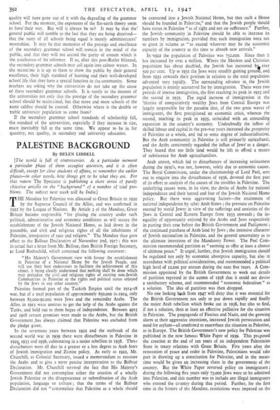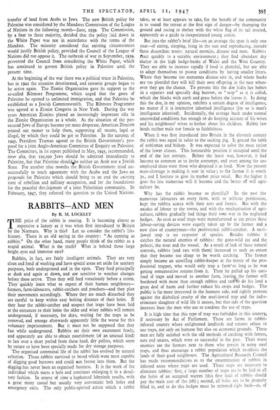PALESTINE BACKGROUND
By HELEN LIDDELL
[The world is full of controversies. At a particular moment a particular phase of them occupies attention, and it is often difficult, except for close students of affairs, to remember the earlier phases—in other words, how things got to be what they are. For that reason The Spectator is publishing a short series of purely objective articles on the "background" of a number of vital pro- blems. The subject next week will be India.] THE Mandate for Palestine was allocated to Great Britain in 1920 by the Supreme Council of the Allies, and was confirmed in 1922 by the League of Nations. By Article 2 of the Mandate, Great Britain became responsible "for placing the country under such political, administrative and economic conditions as will secure the establishment of the Jewish National Home, as laid down in the preamble, and civil and religious rights of all the inhabitants of Palestine, irrespective of race and religion." The Mandate thus gave effect to the Balfour Declaration of November znd, 1917; this -was
in actual fact a letter from Mr. Balfour, then British Foreign Secretary, to Lord Rothschild, which contained the following statement :
"His Majesty's Government view with favour the establishment in Palestine of a National Home for the Jewish People, and will use their best endeavours to facilitate the achievement of this object, it being clearly understood that nothing shall be done which may prejudice the civil and religious rights of existing non-Jewish Communities in Palestine or the rights and political status enjoyed by the Jews in any other country."
Palestine formed part of the Turkish Empire until the 19/4-18 war, but of a total population of approximately 65,o,000 ina914, only between 85,000-90,000 were Jews and the remainder Arabs. The Allies in 1915 were anxious to get the help of the Arabs against the
Turks, and held out to them hopes of independence. Between 1.9I5 and 1918 certain promises were made to the Arabs, but the British Government has always claimed that Palestine was excluded from the pledge given.
In the seventeen years between 1922 and the outbreak of the
second world war in 1939 there were disturbances in Palestine in 1929a 1933 and 1936, culminating in a major rebellion in 1938. These
disturbances were all due in a greater or a less degree to Arab fears of Jewish immigration and Zionist policy. As early as 1922, Mr. Churchill, as Colonial Secretary, issued a memorandum to reassure the Arabs and to give a more precise interpretation to the Balfour Declaration. Mr. Churchill stressed the fact that His Majesty's Government did not contemplate either the creation of a wholly Jewish Palestine or the disappearance or subordination of the Arab population, language or culture ; that the terms of the Balfour Declaration did not "contemplate that Palestine as a whole should be converted into a Jewish National Home, but that such a Home should be founded in Palestine," and that the Jewish people should have status in Palestine "as of right and not on sufferance." Further, the Jewish- community in Palestine should be able to increase its numbers by immigration, provided that such immigration were not so great in volume as "to exceed whatever may be the economic capacity of the country at the time to absorb new arrivals."
In i.1922 the population of Palestine was 752,000. Since then it has increased by over a million. Where the Moslem and Christian population has about doubled, the Jewish has increased by. over 500 per cent. Up to 1931 the Jews were steadily gaining grounZ, and from 1931 onwards their position in relation to the total population advanced very rapidly. The outstanding advance in,..the Jewish population is mainly accounted for by immigration. There were two periods of intense immigration, the first reaching its peak in 1925 and the second in 1935. The rapid increase of immigration in the 'thirties of comparatively wealthy Jews from Central Europe was largely responsible for the paradox that, of the two great waves of immigrants, the first precipitated an economic crisis, whereas the second, reaching its peak in 1935, coincided with an astounding expansion in the country's economy. Undoubtedly the inflow of skilled labour and capital in the pre-war years increased the prosperity of Palestine as a whole, and led to some degree of industrialisation. But the Arab community in Palestine is still primarily agricultural, and the Arabs consistently regarded the influx of Jews as a danger. They feared that too little land would be left to afford a means of subsistence for Arab agriculturalists.
Arab unrest, which led to disturbances of increasing seriousness during the 1930's, was not, however, solely due to economic causes. The Royal Commission, under the chairmanship of Lord Peel, sent out to enquire into the disturbances. of 1936, devoted the first pait of its effort to analysis of the causes of the troubles in Palestine. The underlying causes were, in its view, the desire of Arabs for national independence and their hatred and fear of the Jewish National Home policy. But there were aggravating factors—the attainment of national independence by other Arab States ; the pressure on Palestine exerted by world Jewry in view of the sufferings and anxieties of the Jews in Central and Eastern Europe from 1933 onwards ; the in- equality of opportunity enjoyed by the Arabs and Jews respectively in putting their case before the British Government and Parliament ; the continued purchase of Arab land by Jews ; the intensive cllaracter of Jewish nationalism in Palestine, and the general uncertainty as to the ultimate intentions of the Mandatory Power. The Peel Com- mission recommended partition as "seeming to offer at least a chance of ultimate peace." It urged, further, that Jewish immigration should be regulated not only by economic absorptive capacity, but also in accordance with political considerations, and recommended a political high level of 12,000 per annum during the next five years. A Com- mission appointed by the British Government to work out details of partition reported in the auunn of 1938 that it could not devise a satisfactory scheme, and recommended "economic federalism" as a solution. The idea of partition was then dropped.
No one looking back from 1947 will deny that it was essential for the British Government not, only to put down rapidly and finally the major Arab rebellion which broke out in 1938, but -also to find, if not a solution, then at least an effective Palliative for the situation in Palestine. The propaganda of Fascists and Nazis, and the growing alarm at their aggressive intentions, increased Jewish persecution and need for asylum—all combined to exacerbate the situation in Palestine, as in Europe. The British Government's new policy for Palestine was published in the now famous White Paper of 1939. This proposed the creation at the end of ten years of an independent Palestinian State in treaty relations with Great Britain. Five years after the restoration of peace and order in Palestine, Palestinians would take part in drawing up a constitution for Palestine, and in the mean- time would be given an increasing share in the government of the country. But the White Paper reversed policy on immigration ; during the following five years only 75,000 Jews were to be admitted into Palestine, and this number was to include any illegal immigrants who entered the country during that period. Further, for the first time in the history of the Mandate, restrictions were imposed on the
transfer of land from Arabs to Jews. The new British policy for Palestine was considered by the Mandates Commission of the League of Nations in the following month—June, 1939. The Commission, by a four to three majority, decided that the policy laid down in the White Paper was not in accordance with the terms of the Mandate. The minority considered that existing circumstances would justify British policy, provided the Council of the League of Nations did not oppose it. The outbreak of war in September, 1939, prevented the Council from considering the White Paper, which has continued to govern British policy in Palestine until the present time.
At the beginning of the war there was a political truce in Palestine, but in 1942 the situation deteriorated, and terrorist groups began to be active again. The Zionist Organisation gave its support to the so-called Biltmore Programme, which urged that the gates of Palestine be opened to unlimited immigration, and that Palestine be established as a Jewish Commonwealth. The Bihmore Programme was agreed at a Zionist Congress in New York. During the war years American Zionists played an increasingly important role in the Zionist Organisation as a whole. As the situation of the per- secuted Jews of Europe became yet more desperate, American Zionism poured out money to help them, supporting all means, legal or illegal, by which they could be got to Palestine. In the autumn of 5945, President Truman agreed to the British Government's pro- posal for a joint Anglo-American Committee of Enquiry on Palestine. The Committee, in its report published in May, 1945, recommended, inter alia, that too,000 Jews should be admitted immediately to Palestine, but that Palestine shouldobe neither an Arab nor a Jewish State. For another nine months the British Government tried un- successfully to reach agreement with the Arabs and the Jews on proposals for Palestine which should bring to an end the existing state of rebellion and military occupation, and lay the foundations for the peaceful development of a joint Palestinian community. In February, 1947, they referred the question to the United Nations.



































 Previous page
Previous page